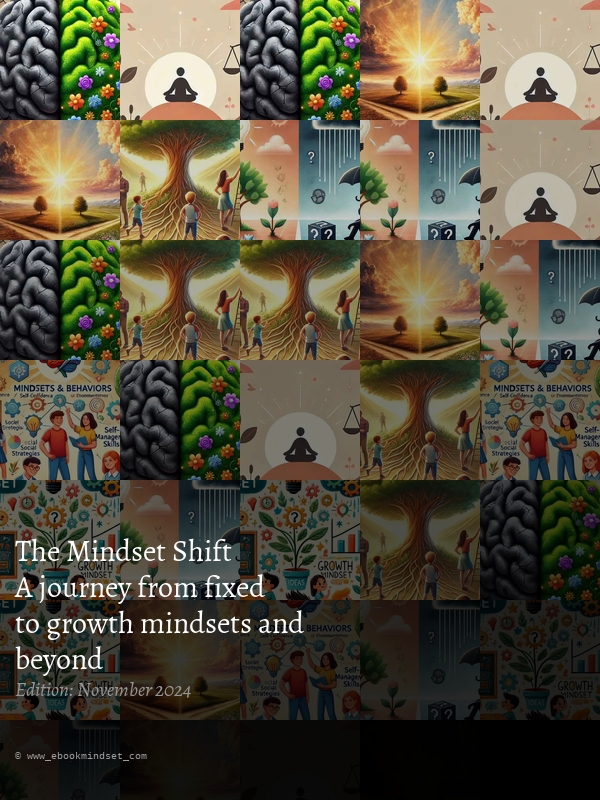Understanding the 7 Mindsets for Personal and Professional Success
In today's fast-paced world, your mindset is crucial for success and well-being. A mindset is your established set of attitudes, beliefs, and assumptions that influence how you approach challenges, opportunities, and life itself. This article explores seven powerful mindsets that can profoundly transform your life, boosting your personal growth and propelling your professional achievement. For example, understanding the characteristics of a fixed mindset, as described in our article on real-life examples of a fixed mindset, can be incredibly insightful and help you identify areas for improvement.
The Importance of Mindsets
Your mindsets shape your perceptions and reactions. They dictate how you interpret your experiences and profoundly influence your behavior. A positive, growth-oriented mindset improves your decision-making, builds resilience, fosters adaptability, and increases your overall happiness and sense of fulfillment. Research consistently shows that individuals with a growth mindset embrace challenges, persevere through difficulties with greater determination, and achieve significantly greater success than those with a fixed mindset. This difference isn't simply about innate ability; it's about the approach and the belief system you adopt.
Overview of the 7 Mindsets
1. Growth Mindset
Popularized by Carol Dweck, the growth mindset emphasizes that abilities and intelligence are not fixed traits but are developed through dedication, hard work, and a persistent commitment to learning. It fosters a deep love of learning and cultivates resilience, both of which are crucial for achieving significant goals. It's not about being naturally gifted; it's about embracing the process of learning and improvement.
- Embraces challenges as growth opportunities, viewing them as chances to learn and improve.
- Persists despite setbacks, viewing failures as learning experiences rather than evidence of inadequacy.
- Actively seeks and learns from criticism and feedback, using it to refine skills and strategies.
- Finds inspiration in others' success, viewing it as motivation rather than a source of envy or competition.
A growth mindset encourages you to step outside your comfort zones, pushing your boundaries and fostering continuous personal development, ultimately leading to both personal and professional success.
2. Abundance Mentality
An abundance mentality is based on the belief that there are enough resources, opportunities, and successes to go around for everyone. This contrasts sharply with a scarcity mentality, which views resources as limited and competitive, fostering a sense of fear and limitation. The abundance mentality is a powerful catalyst for positive change.
- Encourages collaboration and teamwork over cutthroat competition, recognizing the power of synergy.
- Fosters generosity, a willingness to share ideas and support others, creating a collaborative environment.
- Reduces feelings of jealousy and inadequacy by shifting the focus from competition to contribution and growth.
- Creates a positive feedback loop, attracting more opportunities and success through shared accomplishments.
An abundance mentality cultivates healthier personal and professional relationships, creating a more supportive and fulfilling life, both personally and professionally.
3. Willingness to Fail
Fear of failure can be incredibly paralyzing, preventing individuals from taking risks and pursuing their goals with conviction. Embracing failure as a necessary part of the learning process is crucial for innovation, growth, and achieving ambitious goals. It's not about avoiding failure, but about learning from it.
- Failure provides invaluable lessons that inform future decisions and strategies, refining your approach.
- It encourages calculated risk-taking, essential for breakthroughs and making significant progress.
- Understanding failure as an integral part of the journey reduces anxiety and encourages persistence.
- Analysis of failures helps identify weaknesses and areas for improvement, facilitating growth.
Highly successful entrepreneurs and innovators often cite failures as pivotal learning experiences, essential stepping stones on the path to success. They view failure not as an end, but as a crucial part of the iterative process.
4. Long-Term Vision
A long-term vision involves setting ambitious, meaningful goals that extend far beyond immediate achievements. This keeps you focused on your ultimate objectives, providing motivation and direction even during periods of short-term setbacks. It's about having a clear sense of purpose.
- Clearly defined goals aligned with your personal values, providing a strong sense of purpose.
- A strategic plan outlining the steps needed to achieve your goals, providing a roadmap for success.
- Flexibility to adapt your plans as circumstances change, ensuring resilience and adaptability.
- Regular evaluation and adjustment of your plan to maintain focus and ensure progress.
A long-term vision provides sustained motivation during challenges, ensuring your commitment to your chosen path and preventing you from losing sight of the bigger picture.
5. Rule-Breaking Attitude
A rule-breaking attitude doesn't necessarily mean defying laws or regulations; rather, it involves challenging conventional wisdom, thinking outside the box, and questioning established norms to find innovative solutions. This mindset is essential for groundbreaking progress and creativity.
- Encourages experimentation and exploration of unconventional approaches, leading to new discoveries.
- Leads to unique solutions that differentiate you from the competition, establishing a unique value proposition.
- Fosters resilience against societal pressures and the status quo, enabling you to pursue your vision.
- Promotes a culture of innovation and creativity, fostering a dynamic and adaptive approach to challenges.
Individuals with this mindset are often at the forefront of industry change, disrupting established norms and creating new possibilities. It’s about finding better ways to achieve goals.
6. Intuition and Gut Feeling
Listening to your intuition is a powerful tool in decision-making. This mindset encourages trusting your instincts and gut feelings, rather than solely relying on logical analysis, especially in complex or ambiguous situations. It's about recognizing the wisdom of your subconscious.
- Intuition draws from your past experiences, knowledge, and subconscious processing of information.
- It can lead to quicker and more effective decisions, particularly in high-pressure situations.
- Trusting your gut fosters confidence and decisiveness, empowering you to act decisively.
- Developing intuition involves paying attention to your inner voice and recognizing patterns and insights.
Developing this mindset enhances both personal satisfaction and professional success, leading to more aligned decisions and a greater sense of purpose and direction.
7. Positivity
A positive mindset focuses on the good aspects of situations, even during challenging times, rather than dwelling on the negative. This has a profound impact on mental health, resilience, and overall life satisfaction. It's about cultivating a grateful perspective.
- Practicing gratitude regularly, acknowledging and appreciating the positive aspects of life.
- Surrounding yourself with positive influences, limiting exposure to negativity and criticism.
- Engaging in positive self-talk, replacing negative thoughts with encouraging and supportive affirmations.
- Cultivating optimism, approaching challenges with a belief in positive outcomes and solutions.
Positivity significantly improves well-being and enhances relationships, creating a supportive and encouraging environment for personal growth and professional success.
Practical Steps to Cultivate These Mindsets
Adopting these seven mindsets is a rewarding journey, but it requires consistent effort and self-reflection. It's not a quick fix, but a long-term commitment to personal development.
Self-Reflection: Regularly assess your thoughts and beliefs about challenges, successes, and setbacks. Journaling can be a powerful tool for this.
Set Goals: Create specific, measurable, achievable, relevant, and time-bound (SMART) goals aligned with each mindset. This provides focus and direction.
Seek Feedback: Engage with mentors, coaches, or trusted peers for constructive criticism and insights into your strengths and areas for improvement.
Embrace Learning: View every experience, both positive and negative, as a learning opportunity. Analyze what you can learn from each situation.
Practice Gratitude: Keep a gratitude journal, regularly listing things you're thankful for. This shifts your focus towards the positive aspects of your life.
Mindfulness and Meditation: Incorporate mindfulness practices and meditation into your routine to cultivate self-awareness and emotional regulation.
Positive Affirmations: Use positive affirmations to reinforce the desired mindsets and counteract negative self-talk.
Visualization: Visualize yourself embodying these mindsets and achieving your goals. This can help program your subconscious mind for success.
Conclusion
Adopting these seven mindsets is a transformative journey that can unlock greater personal and professional achievements. By shifting your perspective from limitations to possibilities, you empower yourself to overcome challenges, seize opportunities, and achieve your full potential. Remember, it's a process that requires consistent effort, self-reflection, and a commitment to personal growth. Embrace the challenge, trust your abilities, and unlock your potential for a more fulfilling and successful life.




